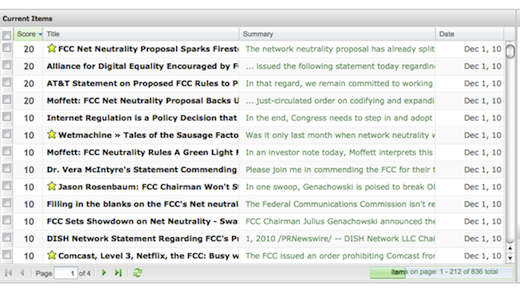I’ve been writing lately on rating and suggestion services and their underlying data prediction technologies, which are fascinating.
What about those users (like me) who don’t completely trust the algorithmically generated suggestions that are proffered?
They can instead lose themselves in the stream of likes and comments that are displayed in the standard “recent activity” box found on the home pages of these sites. It’s a direct way to pick up ideas on movies, books, food, TV shows, and lizards.
I made up the part about lizards, but the point is that with social rating sites, anything in this world can be judged as good or bad and then become a part of the intimate information flow for the rest of humanity to see.
For example, GetGlue, the recommendation service I’ve been referring to in my posts, has an Android (and iPhone) app that lets the crowd comment on what they’re currently reading, watching, listening, or thinking. It’s really a check-in service—Foursquare without being tied to a specific physical place
With my new Yixin Android tablet now on my coffee table, I’ve become another gadget-owning media critic. Continue reading


 Xydo is a recommendation startup I first discovered at Hoboken Tech Meetup. Since then I’ve partially trained GetGlue and Hunch to respond to my tastes (not successfully), perused Parse.ly’s recommendation app for filtering feeds, and gauged Google’s own Prediction APIs and Set suggestion tools (pretty good stuff).
Xydo is a recommendation startup I first discovered at Hoboken Tech Meetup. Since then I’ve partially trained GetGlue and Hunch to respond to my tastes (not successfully), perused Parse.ly’s recommendation app for filtering feeds, and gauged Google’s own Prediction APIs and Set suggestion tools (pretty good stuff).
 I was finally able to spend quality time with the Parse.ly Reader, an app designed to show some of the capabilities of the underlying Parse.ly platform, called P3, which is currently in beta. To be clear, unlike many other players in the recommendation patch (GetGlue, Xydo, Hunch, etc.), this NYC-based startup is not in the business of providing a direct service to users.
I was finally able to spend quality time with the Parse.ly Reader, an app designed to show some of the capabilities of the underlying Parse.ly platform, called P3, which is currently in beta. To be clear, unlike many other players in the recommendation patch (GetGlue, Xydo, Hunch, etc.), this NYC-based startup is not in the business of providing a direct service to users.